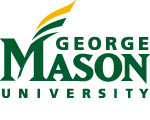Celebration of Distinction
Honoring the Best and the Brightest
Each spring, the George Mason University Alumni Association recognizes and honors outstanding alumni, students, and faculty members for their achievements and contributions to the university. To learn more about all the award recipients, a copy of the "Celebration Program" is available.
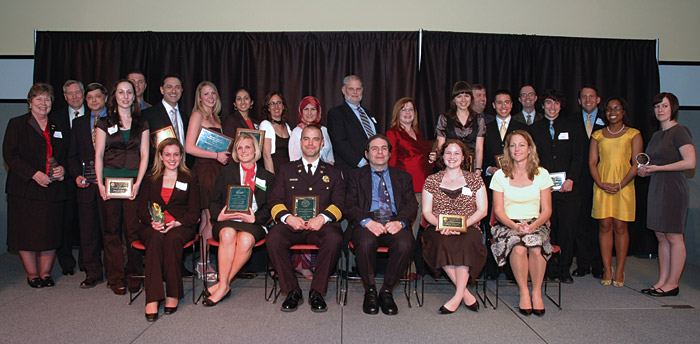
Front row (left to right): Ozge Koray, Sarah Godlewski, Adam Thiel, Harold Geller, Megan Fowler, Jill Jakulski
Middle row (left to right): Naliyah Kaya, George Bitar, Marianna Beddard, Mona Singh, Gina Cerasani, Janna El Horr, William Blanton, Lisa Rosser, Gulnara Mirzakarimova, Luis Contreras, Steven Dunn, Deidra Bailey, Lisa McCarty
Back row (left to right): Penny Welke, Pete Farrell, Jeffery Taubenberger, B. J. Koubaroulis, Barry Broadway, Ted Arnn, David Goldberg
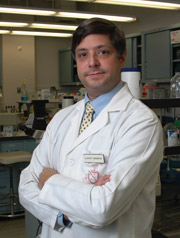 Jeffery Taubenberger
Jeffery Taubenberger
Alumnus of the Year
Jeffery Taubenberger, MD, PhD (BS Biology ’82), is not just an infectious-disease scientist, he’s a pandemic detective—the Sherlock Holmes of influenza. In 2005, Taubenberger solved a medical mystery, identifying the specific cause of the 1918 pandemic that killed nearly 50 million people. The culprit: an influenza virus that began in birds and adapted to humans.
Pandemics occur every 30 to 40 years on average—the last one was in 1968—so Taubenberger’s research is more than mere “historical curiosity,” as he puts it. “We’re using it to investigate what mutations allow such viruses to adapt to humans and how it causes disease,” says Taubenberger, a senior investigator with the National Institutes of Health’s Laboratory of Infectious Diseases in Bethesda, Maryland. “This information can be crucial for developing new drugs and vaccines.”
His papers on the 1918 virus were widely acclaimed—Taubenberger was ABC News’ “Person of the Week” in October 2005—but his motivation is the simple exhilaration of discovery. As a child, he was always interested in biology, a passion that grew in eighth grade when he met William Drohan, a scientist from the National Cancer Institute (NCI). By 10th grade, Taubenberger was doing science fair projects in Drohan’s lab. “I was looking at the possible genetic components to cancer,” he says (you know, typical high-school boy stuff). Taubenberger arrived at Mason as a 16-year-old freshman, played oboe with Mason’s orchestra while working part time for NCI, and composed a piece that the orchestra performed his senior year. Someday he hopes to return and take music classes, but until then, you’ll find him in the lab, performing research that could save millions of lives.
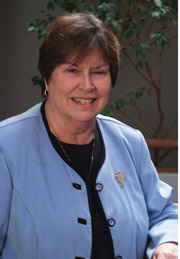 Penny C. Welke
Penny C. Welke
The Alumni Service Award
While in her mid-30s, Penny C. Welke, BIS ’82 and JD ’85, started working as a paralegal. She had always wanted to return to college and complete her bachelor’s degree, but thought that was unlikely.
When she became interested in pursuing law as a career, it was her boss, attorney Jack Crickenberger, who told her about the law reader program, recognized by the Virginia Bar Association. She began reading law and concurrently enrolled at Mason to finish her degree.
After completing a BIS degree in 1982, Welke enrolled in Mason’s School of Law in addition to the reading program. On completing law reading, she took and passed the bar exam in 1984, a year before earning her JD. Now her former boss is her business partner, and she has an active practice in family law, wills, estates, and trusts at Crickenberger & Associates in Fairfax City.
Beyond her law practice, Welke is a professional harpist and sings with choirs and a quartet at her church. She has served Mason in a variety of roles as a member of the Alumni Campaign Steering Committee, cochair of the Annual Fund Committee, vice president of the Alumni Association, charter member of the Legacy Society, and a member of the President’s Circle.
“Everyone needs someone who tells him or her, ‘You can do it!’” she says. “If my educational experiences can serve as an example to others, then that would be great.”
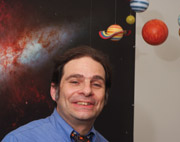 Harold Geller
Harold Geller
Faculty Member of the Year
After almost 16 years of teaching in Mason’s Department of Physics and Astronomy, Harold Geller, MAIS ’92, Certificate Community College Education ’02, and DA Community College Education ’05, this spring finally received a scouting merit badge in astronomy. It was given to him by a group of boy scouts who came to the new campus observatory to view the night skies. They are just one of many community groups with whom Geller has shared his knowledge through observing sessions and astronomy lectures. His office is decorated with hand-drawn thank-you notes from local schoolchildren.
Geller joined Mason as an adjunct faculty member in 1992 after completing his master’s degree. He became a full-time faculty member in 2000 and is currently the associate chair of the department.
Geller is a codesigner of the first astrobiology course taught at Mason, and recently his text for faculty interested in teaching the course, Astrobiology: The Integrated Science Curriculum, was published. He also developed Astronomy for Teachers, a graduate course for educators.
In addition, Geller is the keeper of Mason’s observatory archives and history. He designed, developed, and raised funds for the construction of the university’s new observatory (its third, he will remind you), which will house a 32-inch Ritchey Chrétien telescope that is being custom-built for the university.
“His passion for astronomy is topped only by his extreme love for teaching about it,” says Tere Linehan, assistant dean in the College of Science.
 Malkit (Mona) Singh
Malkit (Mona) Singh
Senior of the Year
Malkit (Mona) Singh may be the only person surprised to find out that she will be honored as Senior of the Year. During her years as an undergraduate at Mason, Singh has become well-known for her devotion to sociology, global health, and community involvement.
Despite being class representative of the University Scholars Program, serving as a Mason Ambassador, and working as president of the American Society for Microbiology, Singh will likely best be known for her scholarship honors. In early 2007, she won a Truman Scholarship, was named a Marshall Scholarship finalist, and became Mason’s first Rhodes Scholarship finalist.
Singh says coming to Mason was the best decision she has ever made. “I don’t think I could have gotten this kind of experience anywhere else,” she says. “My one regret is being involved with so many things that I had little free time to just hang out with friends. But so far, the sacrifice has been worth it because I enjoy being busy and making the most of every moment.”
Before entering medical school in the fall, Singh will work this summer with Samaritan Ministry of Greater Washington. She will be a case worker intern helping the homeless population in Washington, D.C., find employment.
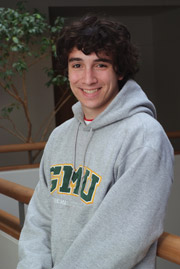 Steven Dunn
Steven Dunn
The Peter C. Forame Student Leadership Scholarship
The young woman had drifted far from shore at New Jersey’s Wildwood Beach when Steven Dunn and his fellow lifeguards launched the boat that would save her life. “We rowed out to her—she was caught in a strong rip current about 150 meters offshore,” says Dunn, a government and international politics major. “I was sitting on the stern of the boat and pulled her in. I’ll never forget it.”
At the age of 20, Dunn, a sophomore, has already saved more than 20 lives. His knack for thriving under pressure and serving others are just two of the reasons why he is this year’s Peter C. Forame Student Leadership Scholarship winner. The president of Mason’s chapter of the National Society of Collegiate Scholars (NSCS), Dunn came to Mason to run track but gave it up in 2007 after a series of injuries and illnesses. “I decided I couldn’t stay healthy long enough to make the enormous commitment to competing at a Division I level,” says Dunn, formerly a distance runner. “I had built my life around running, made my college choice partly because of running, and then had to walk away from it.”
And yet Dunn soon realized that disappointment can breed opportunities. Without track, he devoted more of his time to campus activities, serving as secretary of the Alpha Lambda Delta Freshman Honor Society and leading NSCS charity efforts, all while maintaining a 3.90 GPA.
“I believe I have always possessed leadership qualities,” says Dunn, “but they have grown since I’ve come to Mason.”
 Megan Alissa Fowler
Megan Alissa Fowler
The John C. and Louise P. Wood Undergraduate Scholarship
Megan Alissa Fowler arrived at Mason wondering whether she had made the right choice attending a school so far from home. “Instead of succumbing to homesickness, I focused on academics and joined student activities,” she says.
Fowler took a risk, bringing more than her sharp intellect and giving heart with her to Mason. She suffers with vasovagal syncope, a condition resulting in fainting. “My condition is a quirky trait, something I will live with all my life, but it is not a handicap or an excuse; quite the opposite, I believe my condition has made me stronger in many ways.”
During her time at Mason, Fowler has thrown herself into volunteer work. In addition to tutoring middle school and high school students in Mason’s Early Identification Program, Fowler began working with the University Scholars and the U.S. Holocaust Memorial Museum in September on a service project titled Never Forget, a series of events to educate the public about the Holocaust.
“The greater D.C. area holds myriad possibilities for students, and I certainly want to take advantage of them.” Currently, Fowler is interning at the Folger Theater in Washington, D.C., where she is a part-time house manager. A double major in history and theater, she has made the Dean’s List every semester.
“I have discovered a community at Mason that accepts my eagerness for knowledge and my compassion for all,” Fowler says. “Homesickness is a thing of the past. When I began to call Mason ‘home,’ I knew I made the right decision.”
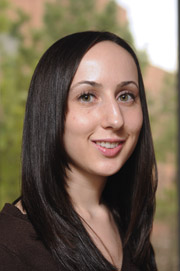 Naliyah Kaya
Naliyah Kaya
The John C. and Louise P. Wood Graduate Scholarship
For Naliyah Kaya, learning has always been her passion. “From an early age, my dream was to become a college graduate—the first in my family—and eventually become a college professor.”
And she is well on her way toward that goal. After earning a BA in sociology from Hampton University in 2006 with a 3.92 GPA and graduating with honors, Kaya came to Mason where she is pursuing a master’s degree in sociology and working as a teaching assistant for the Department of Sociology and Anthropology.
“I am extremely appreciative of Mason’s investment in me; without the teaching assistantship, I would not have been able to attend graduate school,” she says.
Beyond the classroom, Kaya still finds time to share her passion for learning with others. She participates in Mason’s Dream Catchers, a mentorship program designed to help students enrolled in alternative education programs become future Mason students. While at Hampton, she was a mentor in a similar program, Sister II Sister, which reached out to at-risk teenage girls. She has also tutored elementary school children and helped adults prepare to take their GED.
Before coming to Mason, she shared her love of writing poetry with inmates at the Washington State Reformatory, where she taught poetry workshops. The culmination of this work, something Kaya considers one of her greatest accomplishments, led to the creation of the Food for the Soul Monroe Poetry Project, a multi-dimensional presentation of the inmates’ poetry, “designed to bring their voices to the greater community.”
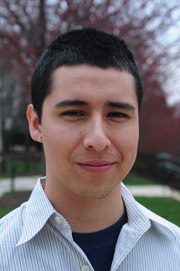 Luis Alberto Contreras
Luis Alberto Contreras
The George Mason University Alumni Association Service Scholarship
Luis Alberto Contreras chooses not to brag of his achievements; instead, he dedicates his time to practicing humility and helping others. “What matters most to me at the end of the day is who I help. I am the student leader and representative for the shelter [Lamb Center] and ask students to come along every Friday,” he says.
Dedicated to community service and serving those in need, Contreras, a global affairs major with a minor in business, has found time in his busy class schedule and resident advisor responsibilities to volunteer for multiple organizations, including the Fairfax County Juvenile Detention Center and the New Orleans Relief Workers Aid, where he helped rebuild parts of Louisiana destroyed by Hurricane Katrina.
Working with Mason’s Catholic Campus Ministry is one of his top priorities, and he sets aside time each week to help the homeless at the Lamb Center. It was there that he took a special interest in one particular shelter resident named Omar.
“We spoke about our lives, our families, and even our problems,” he says. “Over the course of the semester, I would look for jobs for Omar and give him a ride to places he needed to go, write him letters, all the while offering him words of encouragement to help him have faith. Omar now has a steady job and is working toward getting an apartment.”
“If someone asked me what my greatest accomplishment through service was, I would simply say, ‘You can call him Omar.’”
Additional awards given at the Celebration of Distinction are as follows:
College of Science Alumnus of the Year Award: George Bitar, BS Biology ’89
College of Education and Human Development Alumna of the Year: Jill Jakulski, PhD Education ’04
School of Law Distinguished Alumni Award: William J. Blanton, JD ’96
Wayne F. Anderson Award for Distinguished Public Service: Adam Thiel, MPA ’00
School of Management Distinguished Alumni Award: Barry Broadway, BS Management ’87
Department of Communication Outstanding Alumni Award: B. J. Koubaroulis, BA Communication ’04
Career Connection Alumni Award: Lisa Rosser, BA Communication ’89
School of Public Policy Alumni Service Award: Ozge Koray, BS Finance ’96 and MA International Commerce and Policy ’00
Roy Rosenzweig Alumnus of the Year: Leland J. (Lee) White, MA History ’00
Thomas W. Iszard III Alumni Service Award: Lisa McCarty, BFA ’05
College of Health and Human Services Distinguished Alumni Award: David S. Goldberg, MS Health Systems Management ’06
New Century College Outstanding Alumni Award: Sarah Godlewski, BAIS ’04
Student award winners included Deidra Marie Bailey, a government and international politics major, who received the Black Alumni Commitment to Diversity Book Award; Gulnara Mirzakarimova, a finance major, who received the Emerging Business Leader Award; Marianna Beddard, an administration of justice major and WGMU Radio on-air personality, who won the Beth Kauffman Award for Creativity; Jana El Horr and Gina M. Cerasani, MPA ’03, both doctoral students in the Institute for Conflict Analysis and Resolution, who received the Mary Lynn Boland Award for Outstanding Student Service.

